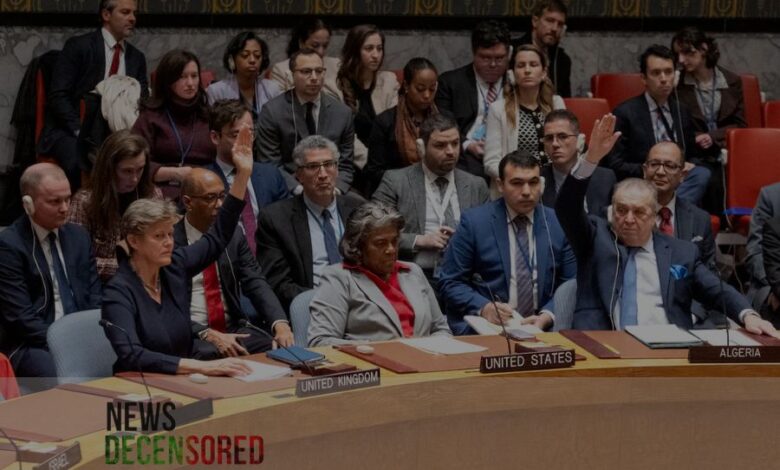The war continues in Gaza despite a Security Council resolution calling for a ceasefire

Fighting continues in the Gaza Strip, Tuesday, the day after the issuance of the first UN Security Council resolution calling for an “immediate ceasefire” between Hamas and Israel, which was quick to express its dissatisfaction with its American ally for not voting against the resolution, as he has done repeatedly since the war broke out more than five months ago.
At dawn on Tuesday, air strikes targeted several places near Rafah, the city located in the far south of the Gaza Strip on the closed border with Egypt, and whose population has increased five times since the outbreak of the war, according to what eyewitnesses told Agency France-Presse.
Eyewitnesses also reported that violent clashes took place in the Al-Rimal neighborhood, Al-Shati camp, Tal Al-Hawa in Gaza City, and the center and west of Khan Yunis.
According to Hamas’s government information office, on Monday night, Israel launched dozens of air strikes in Gaza, Rafah, Deir al-Balah, Khan Yunis, al-Maghazi, and Beit Lahia, in parallel with intense artillery shelling targeting various areas in the Gaza Strip.
Rafah, where more than a million displaced people have taken refuge due to the war, is today threatened by a large-scale ground operation that Israel is preparing, and the international community fears its dangers to the Palestinian civilians crowded there.
At dawn on Tuesday, sirens sounded in Israeli towns near the Gaza Strip, as well as in northern Israel, according to what the Israeli army announced.
Blinken warns Gallant
On Monday, US Secretary of State Anthony Blinken warned Israeli Defense Minister Yoav Gallant during a meeting in Washington of the dangers of invading Rafah, reiterating the United States’ rejection of such a large-scale military operation.
US State Department spokesman Matthew Miller said in a statement that Blinken “reiterated the support of the United States to ensure the defeat of Hamas, including in Rafah, but he reiterated his opposition to a large-scale ground operation in Rafah.”
He added that the American minister “stressed the existence of solutions other than a large-scale ground invasion, which are solutions that would better guarantee Israel’s security and protect Palestinian civilians.”
For his part, Gallant said, “We have no moral right to stop the war as long as there are hostages in Gaza.”
The Israeli minister stressed that “the outcome of this war will determine the shape of the region for years to come,” stressing that in order to guarantee the security of the Hebrew state, Hamas must be “defeated.”
The meeting between Blinken and Gallant was held at the State Department headquarters in Washington, hours after Israel canceled a visit by a high-level delegation to the American capital.
Israel canceled the visit in protest against Washington’s failure to use its veto power in the UN Security Council to prevent the issuance of the resolution calling for a ceasefire.
Majority of 14 votes
The resolution, which was adopted by a majority of 14 votes in favor and one abstention, the United States, calls for an “immediate ceasefire during the month of Ramadan,” which began two weeks ago, provided that it “leads to a permanent ceasefire.” The resolution also calls for “the immediate and unconditional release of all hostages.”
United Nations Secretary-General António Guterres welcomed the issuance of the resolution, stressing the importance of its implementation. He said in a post on the “X” platform: “This decision must be implemented. Failure would be unforgivable.”
As for former President Donald Trump, who was often considered the most pro-Israel American president, he told the newspaper “Israel Hayom” that Israel must “end” the war in the Palestinian Strip because it is losing “a lot of support” around the world.
For its part, Hamas welcomed the Security Council’s decision and accused Israel of “thwarting” efforts to reach an agreement that would establish a temporary truce and allow the release of Israeli hostages and Palestinian prisoners.
“It is enough… “
In the Gaza Strip, residents welcomed the Security Council’s decision, but called on Washington to use its influence over Israel to implement it.
The war broke out following an attack launched by Hamas on southern Israel on October 7, which, according to Israeli figures, killed 1,160 people, most of them civilians. About 250 people were also kidnapped at that time, 130 of whom are still hostage in Gaza, and 33 of them are believed to have been killed.
In response to this unprecedented attack, Israel pledged to “eliminate” Hamas, which it considers, as the United States and the European Union do, a terrorist organization, and launched a large-scale military operation against it in the Gaza Strip.
On Monday, the Hamas Ministry of Health announced that the death toll in the Gaza Strip had risen to 32,333 dead and 74,694 wounded, most of whom were children and women.
On the ground, the situation in Gaza keeps getting worse for the 2.4 million residents of the Gaza Strip who are subject to a complete siege and are threatened with famine, according to the United Nations and international organizations.




